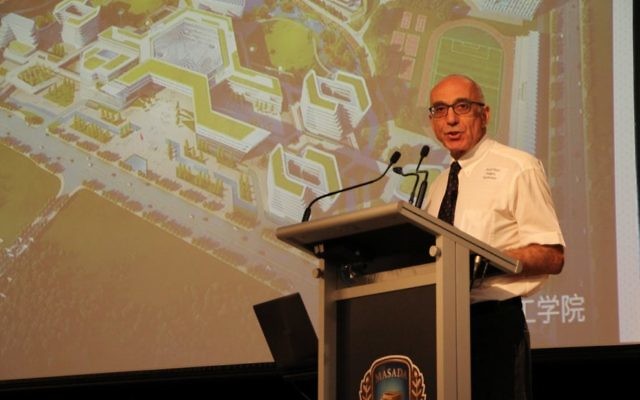‘Israeli chutzpah and Chinese order’
AUSTRALIAN students of engineering - and in future, information technology or life sciences - have the opportunity of completing part or all of their course at Israel's first university campus in China, Guangdong Technion, which officially opened in December.
AUSTRALIAN students of engineering – and in future, information technology or life sciences – have the opportunity of completing part or all of their course at Israel’s first university campus in China, Guangdong Technion, which officially opened in December.
In a Technion Australia event at Masada College last month called ‘Israeli Chutzpah and Chinese Order’, Technion Israel Institute of Technology’s vice president of strategic projects, Melbourne native Professor Paul Feigin, shed light on the new university, which currently has 216 students enrolled in three courses, but is aiming to have 5,000 students in a decade.
“It’s very exciting because all tuition and courses offered at Guangdong Technion will be in English and meet the same standards as in the Technion in Haifa, Israel, so students there will earn Technion degrees and credits for subjects completed there,” Feigin said.
“Instead of going to the Technion in Israel to study engineering, Australian students who want to immerse themselves in Chinese culture and explore joint Israeli-Chinese research opportunities, can now go to Guangdong Technion.
“Why is there a Technion campus in China? For us, as a science and technology university, China is where the action is.
“China is growing at an amazing rate in research and development spending – since 2013 it has overtaken the European Union and is approaching the USA.
“We [Technion] have leverage in technology transfer know-how and aim to create tech-transfer hubs and co-locate a range of companies, start-ups and spin-offs on campus.
“So I believe the Technion’s presence in China is all about being in the right place at the right time.”
The 415,000 square-metre campus – founded in partnership with Shantou University with the support of the municipality’s council, government of Guandong Province and the Li Ka Shing Foundation – is the Technion’s second university outside Israel, following the opening of Cornell-Tech in New York City in mid-2017.
Courses currently offered are in chemical engineering [with a minor offered in environmental engineering], materials engineering, and biotechnology and food engineering in the state-of-the-art north campus, and 80 per cent of enrolled students are Chinese.
“There are three shortlisted designs for an adjoining [phase two] south campus, one of which will soon be chosen by Shantou City’s mayor – of course, we’ll be giving him some good advice about that,” Feigin said.
“There are high expectations in China for this university, which is good for Israel, China and the Technion.”
Technion Australia president Dr Ruth Ratner said the new Guangdong Technion “is recognition that the Technion is a world leader in science and innovation”.
SHANE DESIATNIK


comments